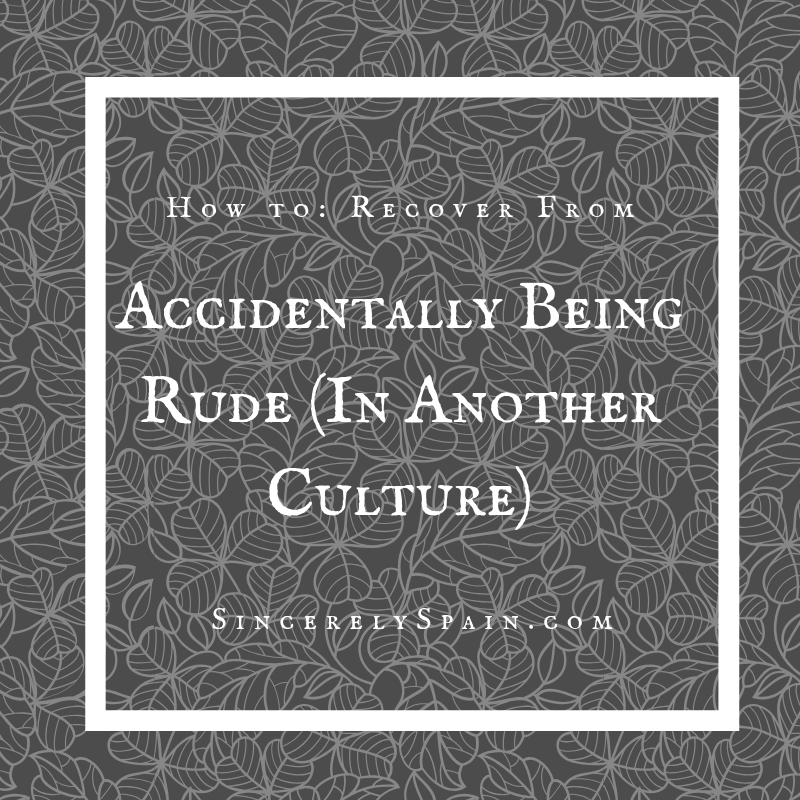
How to: Recover from Accidentally Being Rude… in Another Culture
Dear Alexandra,
Part of living abroad is dealing with making [cultural] mistakes during everyday interactions. Now, you might think that you are culturally aware and that you are not going to put yourself in any situations where you might possibly be rude. However, it is much easier than we think to offend others when we, quite simply, just don’t know what their cultural norms and expectations are. For example, in Spain people great each other by giving dos besos (or two kisses) and while you might not make someone never talk to you again by offering a handshake instead, it could make the situation feel uncomfortable. Another example is taking your shoes off at home in Finland—something I happen to do everywhere—which could cause issues if you arrive at a house here and you are not expecting that you have to remove your shoes to be polite. And while these two examples are probably not that big of a deal in the long run, it is easy to make similar cultural mistakes that can have a greater impact on your intercultural experience.
 So, when I recently read this article on the Harvard Business Review website I was reminded how important it is to work on your culture competences and be aware of the situation when interacting with people from different backgrounds. I feel like the authors sum up the feeling of making a mistake in this paragraph:
So, when I recently read this article on the Harvard Business Review website I was reminded how important it is to work on your culture competences and be aware of the situation when interacting with people from different backgrounds. I feel like the authors sum up the feeling of making a mistake in this paragraph:
It’s surprisingly easy to go from a laid back conversation to having offended someone…
“If the mistake happened in your own culture, you could quickly recover, because you’d have a grasp of the etiquette for apologizing. However, when gaffes happen across cultures, they can leave you at a loss for what to do and how to respond.” (Hahn & Molinsky, 2018)
The authors suggest five tips for “How to Recover from a Cultural Faux Pas:”
-
Ditch your obsession with performance.
-
Equip yourself with knowledge.
-
When you make a mistake, keep your cool.
-
Engage in self-reflection.
-
Get feedback.
And while I can relate to the explanations, they give—and recommend checking out the article—I think we can make it simpler (if that is possible with something as complex as culture). In fact, I feel like we could structure how to deal with ‘Cultural Faux Pas’ in the same three phases we talked about cultural competences: awareness, understanding, and behavior and skills. Therefore, if I were to give you advice on how to deal with situations where you have [unintentionally] been rude, this is what I would tell you:
1.) Awareness:
Aim to be aware of both of yourself and of the situation you are in. Unless you are aware of what you are doing and how that could potentially impact the situation you are in, you might not even notice that you have been rude. By paying attention to what you have done and what the reaction to that action/phrase has been, you will be able to actively take on different situations where you might find yourself having to make up for something you’ve done/said.
At the same time, I would highly recommend being aware of what is going on around you because we can learn a lot just by watching how other people act in different situations. This goes for anything from seeing how to formally greet someone in a first time meeting situation to knowing how you are supposed to eat your food. Pay special attention to things like the types of questions that seem appropriate and the amount of space people give each other.
2.) Understanding and Knowledge:
Try to understand and know about the culture(s) you are in and how they could potentially create conflict with your own cultural expectations. In this case, I would consider that understanding is mostly based on empathy whereas knowledge is related to facts or specific information that you might have gathered about a place. However, both are more theoretical (in comparison to the next step which requires practical application); although both are also extremely important if we want to ensure that we are able to act appropriately in different social situations.
 In addition, this understanding and knowledge is important when trying to get ourselves out of complicated situations where we might have, accidentally, “put our foot in it” (meter la pata is also a common Spanish phrase that means you’ve said or done something you weren’t meant to). This is because when we are in uncomfortable situations, we often revert back to our cultural basics—that is what we learned growing up—and only with knowledge and understanding will we be able to act appropriately.
In addition, this understanding and knowledge is important when trying to get ourselves out of complicated situations where we might have, accidentally, “put our foot in it” (meter la pata is also a common Spanish phrase that means you’ve said or done something you weren’t meant to). This is because when we are in uncomfortable situations, we often revert back to our cultural basics—that is what we learned growing up—and only with knowledge and understanding will we be able to act appropriately.
3.) Behavior and Skills:
You should work to develop your behavior and skills for coping with diverse cultural situations in order to deal with potential mistakes. Having the ability to practically apply your knowledge and skills will be key if you are to be successful when interacting with other cultures. That is because no matter how aware you are and how much knowledge you have developed, if you are not able to put it into practice, this information doesn’t really serve you.
 These behaviors and skills should be based on what you observe during the previous two sections (awareness and understanding and knowledge). That is because even when you think you might know how to solve a problem or resolve a conflict, when it comes to doing it in another culture you should try to apply their norms. Now, don’t expect it to be easy (because it’s not), but consider how you can hone your skills to the point where you are able to easily use them.
These behaviors and skills should be based on what you observe during the previous two sections (awareness and understanding and knowledge). That is because even when you think you might know how to solve a problem or resolve a conflict, when it comes to doing it in another culture you should try to apply their norms. Now, don’t expect it to be easy (because it’s not), but consider how you can hone your skills to the point where you are able to easily use them.
From someone who has been uncomfortable without knowing why, due mostly to unknown cultural differences, training your abilities will normally mean having to get outside your comfort zone. It can be scary but the best way to improve is to practice (theoretical learning will only get you so far here). If you feel really uncomfortable consider role playing or imagining yourself in an awkward situation and think through how you might get through it.
I hope that these three steps, something that you should already be working on for your travel, study, or live abroad experience, can help you deal with mistakes you make in different cultures. Remember: it’s not necessarily going to be easy, but with a little bit of practice, you will get the hang of it!
What are your top tips for recovering from being rude in another culture?
Sincerely,
Spain




